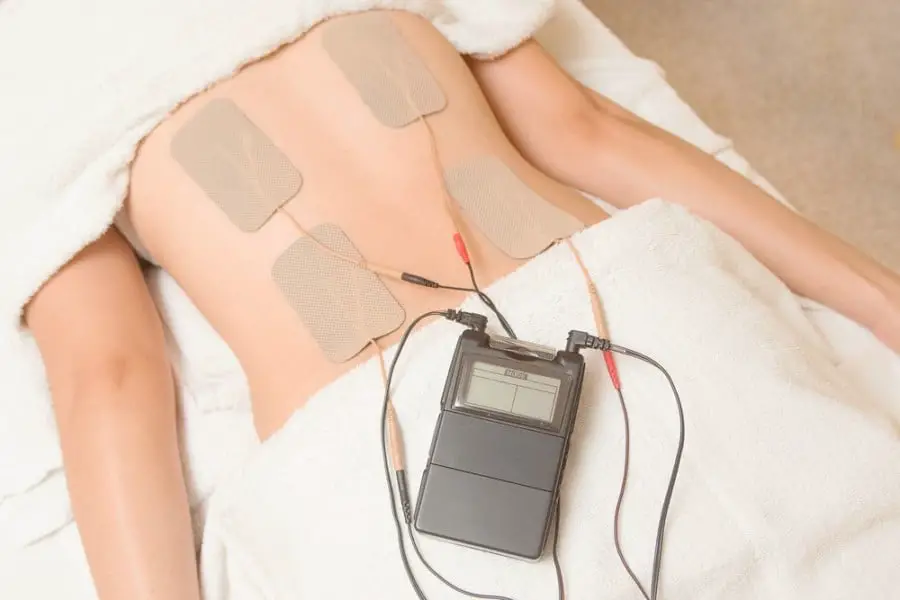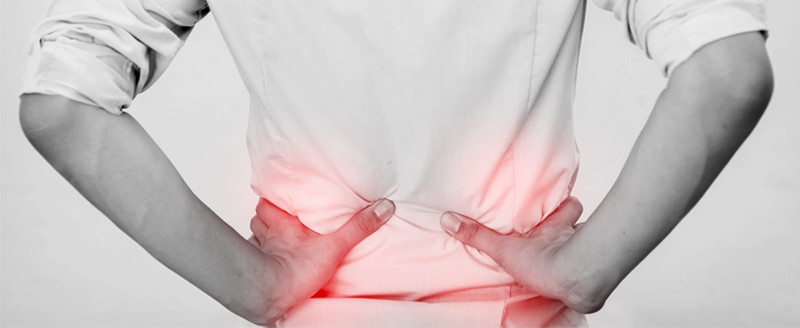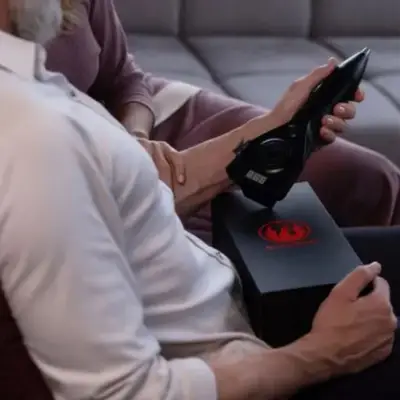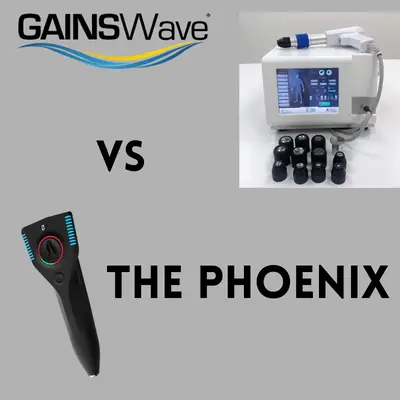Having a herniated disc can be extremely painful and debilitating. While there are plenty of treatment methods out there like NSAIDs, physical therapy, and muscle relaxers, they only seem to provide short-term relief, and they don’t work for everybody.
So, does a TENS unit help aherniated disc? A TENS unit can be used to relieve lower back pain and improve posture in those with herniated discs and lower back conditions. It can also help to reduce swelling and stiffness in the lower back. This can help to improve your mobility and overall range of motion.
Herniated discs tend to be quite complicated conditions. So, we’re going to review what exactly a herniated disc is, how this condition is typically treated, and how a TENS unit might help with pain relief.
What Is a Herniated Disc?
In between each of the vertebrae in your spine is a jelly-like disc that provides cushioning to your vertebrae and spine. When these discs slip out of place or even rupture, this is known as a herniated disc.
When you have a herniated disc, the disc begins to irritate the local nerves. This can cause a significant amount of pain and numbness in your lower back. However, it’s not unheard of to have pain or numbness radiating down the legs.
How Are Herniated Discs Usually Treated?
There are quite a few treatment methods available for herniated discs, but surgery isn’t the most popular. Unless your herniated disc is causing severe pain or immobility, you’ll probably rely on other non-surgical pain relief methods.
Let’s go over some of the more common treatment methods for herniated discs.
Pain Relieving Medication
There are two types of medications that can be used to treat the pain associated with herniated discs: NSAIDs and opioids.
NSAIDs, also known as nonsteroidal anti-inflammatory drugs, are your basic over-the-counter pain relievers like Aleve and Advil. They can help to reduce stiffness in your lower back, improve your range of motion, and reduce your pain.
Opioids are much more intense pain relievers and require a doctor’s prescription. Considering the fact that studies have yet to prove that opioids are significantly more effective than basic NSAIDs, they aren’t typically prescribed. They also can be quite addicting, so avoid an opioid prescription if you can.
Muscle Relaxers
Muscle relaxers are medication that helps to reduce muscle spasms, which can be incredibly useful if your herniated disc is causing muscle spasms in your lower back. They can help to improve your overall quality of life and your mobility.
Cortisone Shots
Cortisone shots are injections used around your herniated disc site, typically administered over a series of shots. They seem to be effective at reducing the swelling of your herniated disc as well as preventing the onset of lower back pain. The benefits can sometimes last for several months or years, which makes cortisone shots a popular option.
Physical Therapy
Physical therapy can be useful for just about any injury or condition. When it comes to herniated discs, you can enlist the help of a skilled physical therapist to build core and back strength and return some movement to your lower back.
A physical therapist can also walk you through exercises to help ease your condition, apply heat packs to reduce pain, and also massage the impacted area to promote relaxation in the surrounding muscles.
TENS Unit to Treat Herniated Discs
Since herniated discs are often characterized by the immense amount of pain they cause, it should come as no surprise that a TENS unit can help to relieve your pain. In fact, there are plenty of recent studies that have proven this exact concept.
Now, we’re going to review some of the scientific data that backs up the benefits of a TENS unit on herniated discs.
Pain Relief
In a 2010 study, researchers recruited a group of individuals with degenerative disc disease in the lower back region. There were two groups within the study, each of which received TENS treatments. The first group wore orthotics and received TENS treatment three times a day for 20 minutes at a time. The other only had TENS treatment once a day for 20 minutes.
The results proved that the group wearing the orthotics and receiving three sessions a day at 35 Hz and 150-microsecond pulses benefited most. They experienced less stiffness, greater mobility, and increased range of motion.
These findings are monumental for individuals with herniated discs that don’t seem to be improving with normal treatment methods (i.e., medication, cortisone, physical therapy).
Posture Control
In a recent study conducted in 2015, researchers gather up a group of individuals reporting chronic lower back pain. The study was focused on the idea that lower back pain could impact postural control. The study ultimately determined that using a TENS unit could be highly beneficial in patients with severe lower back pain, such as those with herniated discs.
In fact, the study honed in on 250-microsecond pulses measuring in at 7 Hz. The sessions lasted for about 15 minutes at a time, and the electrodes were strategically placed about 1 centimeter away from the spinal processes of the impacted vertebrae.
Herniated Disc TENS Unit Placement
The goal of using your TENS unit is to reduce the activation of the local nerves and ease the pain caused by your herniated disc.
When you have a herniated disc, it’s most likely going to be in your lower back, also known as the lumbar region. There are a few electrode placement methods you can use to target your herniated disc pain.
You basically have the choice between two or four electrodes attached to your lower back, usually an inch or two away on each side of the spine. If you’re using four different electrodes, they should be surrounding the impacted disc.

Obviously, you want to start out at a low setting and begin to increase the frequency and the pulse length. The ideal length of time for a TENS unit session is between 20 and 30 minutes. Anywhere between 7 Hz and 35 Hz has been seen as generally effective.
Want to know where else a TENS unit electrode pad can be placed? Check out my TENS placement guide here
The TENS Belt
If you’re interested in a TENS unit that focuses primarily on the lower back, then you might want to think about investing in a TENS belt. Though a little pricey, this can ease the process of carefully attaching the electrodes to your lower back, which tends to be a little tricky.
What makes these belts so effective is that the electrodes are attached to the interior of the belt. All you have to do is attach the belt around your lower waist/back and adjust the monitor attached to it.
They usually come with four attached electrodes and auto-shutoff features, so you’re not overwhelming your lower back. The only issue is that you don’t have the ability to adjust the actual placement of the electrodes, so these are only really useful if your herniated disc is low in the lumbar region.
Conclusion
Your herniated disc is obviously painful and impacts just about every area of your life. However, you don’t have to settle for this pain any longer. If you’ve tried NSAIDs, cortisone shots, and muscle relaxers only to find that your pain persisted, it’s time to take the next step in the healing process.
Using a TENS unit on your lumbar region is a great way to target the pain caused by your herniated disc. Better yet, you might be able to see some long-term benefits after only a few sessions with your TENS unit.
Sources
- Mayo Clinic: Herniated disk
- NIH: Effect of TENS on pain relief in patients with degenerative disc disease in lumbosacral spine.
- NIH: The effects of Transcutaneous Electrical Nerve Stimulation on postural control in patients with chronic low back pain
- AANS: Herniated Disc
- WebMD: Could You Have a Herniated Disk? Symptoms and Diagnosis
- Cleveland Clinic: Herniated Disk Management and Treatment
- NIH: Does Opioid Pain Medication Use Affect the Outcome of Patients with Lumbar Disk Herniation?
- Harvard: Here’s something completely different for low back pain





2 responses to “Does a TENS Unit Help a Herniated Disc?”
[…] of the time sciatica is caused a herniated spinal disc, a tear usually the result of the body simply aging, though it could also occur from improper heavy […]
[…] a massage gun help with a herniated disc? Click here to learn […]